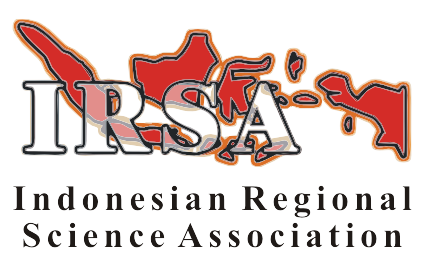July 29, 2024
2024 WINNERS OF IRSA BEST PAPERS
IRSA congratulates the recipients of the 2024 IRSA-SMI Institute Paper Awards:
- Denny Riezki Pratama (Kyushu University) for his paper: “No Easy Harvest: Resource Extraction, Changing Ecologies and The Water Struggle of Small Farmers in Kutai Timur, Indonesia”.
- Udin Suchaini, I Kadek Dede Dwipayana and Suci Ayu Lestari (BPS) for their paper: “Evaluation of Village Index in Relation to Poverty Alleviation”.
- Dhaniel Ilyas (Universitas Indonesia) for his paper: “Urban Density and Commuting in Jakarta Greater Area: City Spatial Planning to Promote Institutional and Local Economic Growth”.
IRSA congratulates the recipients of the 2024 IRSA-BKF Paper Awards:
- Dyah Wulan Sari, Widya Sylviana, Haura Azzahra Tarbiyah Islamiya, Andi Faisal Anwar, Selvi Wahyunia and Aminata Silva (Universitas Airlangga) for their paper: “Does Young and Small Firm More Efficient? Evidence from Indonesian Palm Oil Industry”.
- Etty Puji Lestari, Tri Kurniawati Retnaningsih (Universitas Terbuka), Rossanto Dwi Handoyo, Kabiru Hannafi Ibrahim, Elok Lita Pradinda, Yessi Rahmawati, Deni Kusumawardani, Tri Haryanto, Angga Erlando (Universitas Airlangga) and Tamat Sarmidi (Universitas Kebangsaan Malaysia) for their paper: “Small and Medium Industry Export Development Strategy”.
- Andi Irawan (Institut Teknologi Sepuluh November) for his paper: “Regional Income Disparities in Indonesia: Measurements, Convergence Process, and Decentralization”.
IRSA congratulates the recipients of the 2024 IRSA-PROSPERA Paper Awards:
- Maxensius Tri Sambodo, Mesnan Silalahi, Felix W. , Alan R. Farandy, Ikval Suardi, Ika Inayah, Eka Nurjadi (BRIN), Lucky Lontoh, Anissa Suharsono, Shruti Sharma (IISD) and Neil McCulloch (Policy Practice) for their paper: “Gender Equality and Social Inclusion (GESI) in the Context of Clean Energy Transition for Cooking: Household Perspectives”.
- Akhmad Rizal Shidiq for his paper “Whither Carbon Trading in Indonesia? A Systematic Review”.
- Alin Halimatussadiah, Fachry, A.R. Afifi, Roes E.G. Lufti (Universitas Indonesia), Wikus Kruger (U. of Cape Town) and Fabian Wagner (Tech. U of Denmark) for their paper “The Country of Perpetual Potential: Why is It so Difficult to Procure Renewable Energy in Indonesia?”.

